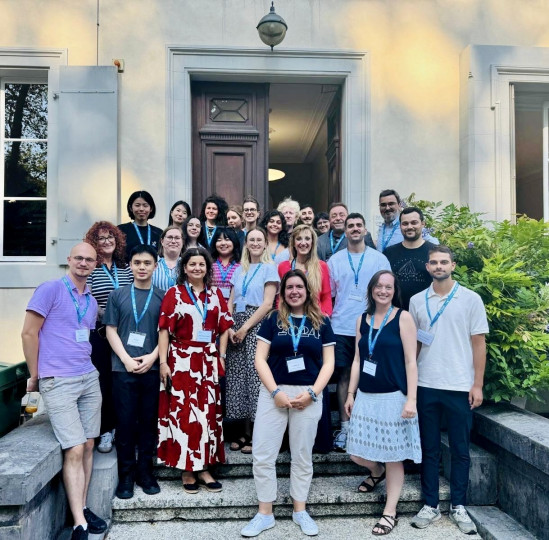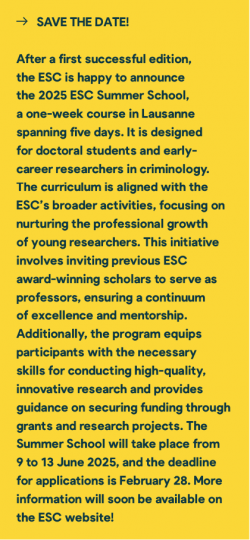THE ESC SUMMER SCHOOL

For most academics, summer offers a well-deserved break, the pressure to complete lingering projects, a mountain of administrative tasks, or the nagging anxi- ety of launching something new ahead of the autumn term. However, for PhD students or early career re- searchers, summer can feel unsettling as university de- partments are empty, leaving them to work in isolation on their life-changing project (as every student dares to believe about their PhD). However, the ESC Summer School could not have been launched at a better time.
While browsing the ESC website for more details about the 2024 conference, I stumbled upon the advert for the ESC Summer School. The meticulously crafted schedule for five days of training with fellow criminologists and the chance to learn from experts I had only encountered in publications was an op- portunity I could not miss. The application process was straightforward, managed by a highly responsive team and required my CV, a motivation letter, and a chapter from my current research. After submitting everything, I waited impatiently for the final decision. With only a few available places, I knew competition would be fierce, and excellence was the standard. I could not have been happier when I received the admission letter.
Situated in the heart of nature with a stunning view over Lake Léman, the University of Lausanne’s cam- pus enthusiastically greeted me and my fellow at- tendees. At this inaugural edition of the ESC Summer School, I experienced for the first time the joy of being part of a European community of criminologists — one that has been carefully built since the European So- ciety of Criminology’s inception in 2000. The attend- ees represented nearly every European country, and some came from as far as South Korea.
The overarching theme of the ESC Summer School was the ‘Getting the Grant’ workshop, led by Fer- nando Miró-Llinares. While it proved to be the most challenging task of the school, it provided us with the tools, knowledge, and confidence to approach grant applications following the model of the European Research Council grants. As part of the workshop, we worked in randomly assigned teams, developing new grant proposals on topics outside our usual areas of expertise. From brainstorming ideas, crafting research designs, practising budgeting, and delivering a final presentation to a critical panel, we were immersed in the real-world scenario of applying for — and hope- fully securing — a grant. In the spirit of John Dewey’s educational philosophy, we learned best about grants by working on them with real teams and addressing actual research problems.
Lectures ranged from crime trends in a comparative perspective (Marcelo F. Aebi), to trends in white-col- lar, organised, and cybercrimes (Michael Levi), to new approaches in victimology (Josep María Tamarit Sumalla), and advanced techniques in NVivo (Lorena Molnar), offering a broad understanding of various criminological areas. While my expertise lies in prison research, each lecture expanded my perspective and challenged me to recognise the interconnected na- ture of different criminological topics. The workshop by Alberto Chrysoulakis on how to design and write high-impact papers was transformative, shifting my approach to writing. It highlighted how key components — identifying critical issues, grounding in theory, empirical robustness, analytical soundness, and ethical considerations — must be carefully planned to ensure that our work can influence scholarship and make an impact beyond academia. Moreover, Letizia Paoli’s session on designing and developing long-term criminological research introduced me to the newly developed Harm Assessment Framework. This prompted me to reconsider my understanding of crime and think more critically about harm in my study. Experiences like these, which engage directly with issues at their core, are essential for advancing thought and developing new lines of inquiry — areas that traditional university departments often lack the time or resources to fully explore.
The time at the Summer School was thoughtfully curated to allow networking with fellow attendees and experts. Every lunch and coffee break buzzed with discussions about research and careers. At the same time, dinners provided space for deeper con- versations about the essence of being a criminologist. After watching The Third Man — a timely reminder of
post-war Europe — the Summer School invited us to reflect, sparking discussions on warfare, crime, and loyalty. The walks through the terraced vineyards and the picnic by Lake Léman provided relaxing moments where bonds naturally formed. I believe the European Society of Criminology’s investment in us, the young scholars, extends beyond the knowledge and skills we gained during the Summer School. It has also fostered essential support networks for those just entering the field. Over the five days of training, unseen qualities like friendship, trust, and collaboration were nurtured, giving the young academic community greater confi- dence to pursue research that can make a meaningful impact on European communities. As the African proverb goes, “If you want to go fast, go alone. If you want to go far, go together.” Togetherness was vibrant at the ESC Summer School.
The coordinators — Marcelo F. Aebi, Fernando Miró- Llinares, and Lorena Molnar — along with guest speak- ers such as Josep Maria Tamarít Sumalla, Letizia Paoli, Michael Levi, Alberto Chrysoulakis, and Jakub Drápal, created an inspiring hub for young criminologists at this inaugural edition of the ESC Summer School. To- gether with my fellow attendees, we planted the seeds of values, principles, and best practices in ground- breaking research that, with patience, will one day bloom. If you are reading this article, the ESC Summer School might be your best opportunity to connect, learn, and become part of the ESC community. If you have already been accepted, make the most of the experience —actively engage in the workshops, con- nect with your peers, and do not hesitate to share your ideas with the experts. They were once in your shoes, searching for answers, and can offer invaluable advice. Take from Lausanne Le Savoir Vivant!
I would like to extend my heartfelt gratitude to the European Society of Criminology for creating this Summer School, to the organising committee for en- suring that each of us had a lovely experience, to the speakers for generously sharing their time, expertise, and insights, to the attendees who made this journey enjoyable. Finally, thanks to the University of Laus- anne for hosting us on their beautiful campus.

